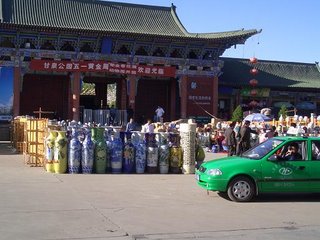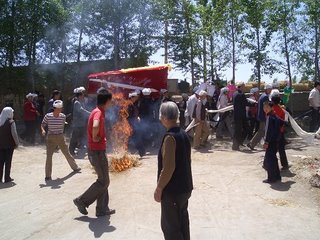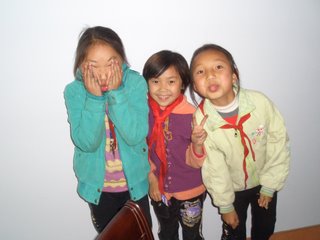
There is a saying in China that "you aren't a real man until you've stood on the Great Wall", so after last weekend I'm happy to know I'm a real man in the eyes of the Chinese. I went with MoMo, and it was a big trip for her - only the second time in her life she has left Zhangye. At first she had to cancel because her mother didn't trust a foreigner going to another city overnight with her daughter (she's 22 with a job and likely supporting her mother), but I smoothed things out and got train tickets going there and back the same day. It's a three-hour trip to Jiayuguan, the city near the fort that marks the traditional west end of the wall, and the morning train was certainly that - 5:30am. It was still dark when we met in the square to get a taxi to the train station. When we arrived taxi drivers, seeing a foreigner and a quiet Chinese girl, persisted in trying to talk us into "four places, for 140 yuan", or "3 places, 160 yuan"; God knows where, but when I finally got across that we were only going to the Great Wall it was, lo and behold, 11 yuan on the meter. The first taxi driver had actually cut in front of the line to buy us our return train tickets, and I can make an educated guess what he was shouting at us after we turned him down and he then saw us getting into another taxi.
The Great Wall was not disappointing, and I like the idea of seeing the most remote end of it. All around Jiayuguan is a backdrop of desert and mountains, and there was a beautiful blue sky that day. The site at Jiayuguan is a fort compound, so along the wall are a number of the Chinese-style tiered-roof buildings. Most of it must have been reconstructed, because it didn't look very old at all. Because of the May Day holiday I was afraid it would be crowded with people, but it wasn't bad at all, and I was surprised to see only one other foreigner. There was an area outside of the wall where camel and horse owners let you ride or pose for pictures for a small fee, so the two of us spent 5 or 10 minutes with a camel, a very cool experience. Me and MoMo don't talk much, but I was glad not to go alone and I've always been of the opinion that talking is overrated.
The afternoon was spent in the city, killing time until our train at 5pm and fighting off exhaustion. Jiayuguan is a very clean but unspectacular city, very new and more similar to an American city than Zhangye. We found a decent enough park in which to sit down and fall asleep before it was time to go. Usually I take advantage of the opportunity to learn some Chinese from MoMo but I didn't really have the energy to talk at that point. On the train back all I wanted to do was sleep, but China thought otherwise. A young man sitting across the aisle from us started talking to me, as they tend to do, and being too polite to tell him off I gave the least enthusiastic one-word answers I could, not that subtle hints like that are ever taken. He then got out his video camera and said "hey, look over here!" so he could get me on film; I can sort of tolerate people I don't know wanting pictures with me, but that was just too much. Unfortunately, the mother sitting in the seat directly across from us left and the young man and his buddy took the chance to sit closer. Then they started a card game with us, the last thing I felt like doing, but of course I am too polite for my own good, especially on a train when there'll be no escaping the person for the next two hours. The loser of each round had to do absurd things like lick the window; my enthusiasm then hit a new low when it turned out he was from Zhangye and was talking about keeping in touch and having me to his house, but perhaps he got the hint after all, because he didn't follow through.
That night I ate alone at one of the best restaurants I know, which like most classy restaurants is on the second floor with windows overlooking the street. I could see the waitress standing next to my table starting as if to say something and then hesitating, and then finally asking what I did. At first I thought she was saying "what are you doing", but I realized that would be a pretty stupid question at a restaurant, and I told her what my job was. We only made one other exchange, but towards the end of the meal she handed me a piece of paper and told me to look. It was a note, in Chinese, which read "Make friends? (something) (something) telephone number?". That's the first time a waitress has asked for my telephone number since... ah, that's right, that doesn't ever happen to me. I was flattered, and I gave it to her. I didn't get her name but it shouldn't be hard to place the nervous girl speaking Chinese if she calls. I think staying in small-town China too long must give you an inflated opinion of yourself, so I like being grounded by brutal honesty, such as say, my Chinese lessons (I'm starting to hand her pen after writing a character before she even says "no, that isn't right" or "hm, that doesn't look good"). I like being occupied in my own world so I have to adjust to being so public; I was at the ATM with MoMo on campus, and when I left the booth she said "a man says to wait for him". Two minutes later, a young man I'm certain I've never met gave me a photo of me and Xiao Ma at the first music competition, which apparently he had handy at his place. He smiled at me very enthusiastically but didn't really say anything, so I thanked him and we sat in awkward silence until he left. I asked MoMo if she knew him, and she said "no, but I think everyone knows you".
 Children's Day is June 1st in China, so every Sunday evening this month there will be a performance in the square from a different school. Last Sunday was the start, with very entertaining dance and music performances from small children in silly costumes. A group of children milling around the audience in costume noticed me, so I ended up getting 20 children interrogating me from every direction.
Children's Day is June 1st in China, so every Sunday evening this month there will be a performance in the square from a different school. Last Sunday was the start, with very entertaining dance and music performances from small children in silly costumes. A group of children milling around the audience in costume noticed me, so I ended up getting 20 children interrogating me from every direction.





